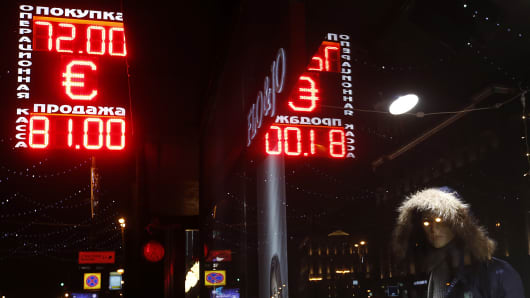The latest battle in this financial war is the engineered drop in oil and subsequent collapse of the Russian ruble. Now that this battle has been waged investors need to know what/where the next battlefield may be.
Read MoreOp-ed: The one person who can bail out Putin
In order to answer this question we need to understand what has transpired over the last few days. Many have been shocked by the lack of intervention by the Central Bank of Russia (CBR) in the days leading up to the currency collapse. Implicitly or explicitly, it appears Russian President Vladimir Putin has allowed a raid on the central bank currency reserves to benefit the oligarchs and state owned corporations. These corporations have issued debt in rubles and either immediately converted into US dollars or have used the debt as collateral at the CBR. The CBR had a choice to defend the ruble and give its foreign currency reserves to speculators or give those reserves to the state owned corporations. The lack of serious currency intervention suggests the CBR has chosen the latter.
The economic impact of this decision is likely to be felt by Russian citizens as they encounter double-digit inflation. If Putin does not handle the internal situation correctly then Russia could face social unrest which may threaten Putin's leadership. Therefore, Putin's next move will define the next battle in the global financial war. The leading battlefield candidates are the wheat market, U.S. Treasurys and Gold.
The currency collapse could accelerate Russian aggression in Ukraine. In my view, the purpose of the invasion has always been to control the port cities along the Black Sea. Since roughly 30 percent of the global wheat supply moves through these ports, control gives Putin a formidable economic weapon. Since further aggression risks more economic sanctions it is unclear if this is the most probable move.
Read MoreDid Russia, North Korea change the game for the market?
The most effective move would be a financial attack on the U.S. Treasury market. Russia is one of the largest holders of U.S. Treasury securities and with a push of a button it could begin to unload its position. This move would have two effects — Russia would get much needed foreign currency (U.S. dollars) and it would economically damage the United States by forcing interest rates higher. Once in possession of U.S. dollars, Russia could use it to defend the currency, pay off state owned corporate debt, or buy gold.
Defending the currency would have little impact as the CBR would continue to battle with speculators. Paying off corporate debt would benefit Russian corporations over the population. If, indeed, social unrest caused by inflation threatens Putin's leadership, Russia would be well served to be the first country to back its currency with gold. This move would immediately solve the inflation problem and placate the population.
Of course, none of us know what the next move will be, but rest assured markets will try to anticipate. This is a game of probabilities not certainties. My concern is that politicians have not considered the full spectrum of a financial war. Perhaps the computer from the hit movie "War Games" said it best: "The only winning move is not to play."
Read MoreCashin: Why it's not like 1998 all over again



